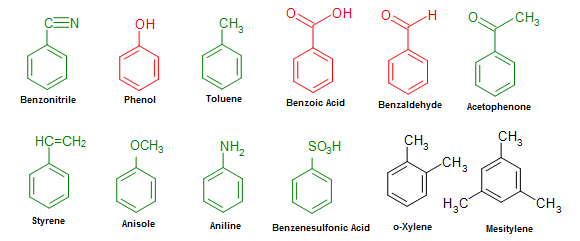Chemistry is a branch of science that deals with the study of matter and the substances that form. The subject speaks about the properties of the matter. The atoms, ions and molecules that a substance comprises and how it is made are learnt in this subject. Chemistry has been divided into many branches. The branch of chemistry that highlights the structure and properties of organic compounds is called organic chemistry. The compounds in organic chemistry consist of hydrocarbons and aromatic compounds. Hydrocarbons are organic compounds composed of elements of carbon and hydrogen only and aromatic compounds consist of a benzene ring with other derivatives. In this article, we will learn about the most vital compound of organic chemistry that is benzene.
What is Benzene?
Benzene is a cyclic hydrocarbon. The chemical formula of it is C6H6, that is, each carbon atom in benzene is arranged in a six-membered ring and is attached to only one hydrogen atom. It is widely used and is abundant in nature. Hence there is not much synthetic preparation required for the preparation of this compound. It was discovered in 1825 by the English physicist Michael Faraday and its structure was determined by Friedrich August Kekule. Large amounts of these compounds are now extracted from petroleum. It belongs to the class of aromatic hydrocarbons that are basically nonpolar molecules.
Properties
Benzene stands unique due to its characteristics. Listed below are a few properties of this unique compound
- It is soluble in an organic solvent but insoluble in the universal solvent that is water.
- It is colourless
- It is in a liquid state at room temperature
- It has an aromatic odour.
- The compound has a moderate boiling point and a high melting point.
- Exhibits resonance.
- It is a highly inflammable substance
Popular Reactions
The parent compound benzene undergoes various reactions to form a wide range of compounds and molecules.Few compounds such as benzene diazonium chloride, nitro benzene are prepared using the few common reactions. Listed below are a few common reactions of the compound:
- Nitration: It reacts with concentrated nitric acid at high temperatures in the presence of concentrated sulphuric acid to form nitrobenzene. This reaction is called the nitration of benzene.
- Diazotization: The process involved in converting a primary aromatic amine into the corresponding diazonium salt of the amine is known as diazotization. Benzene diazonium chloride is prepared using this process.
- Sulfonation: It is a procedure of treating the compound with fuming sulphuric acid to produce benzenesulfonic acid.
- Halogenation: The reaction of halogens in the presence of Lewis acid to form aryl halides. This reaction is called the halogenation of benzene.
Applications
Being the parent of aromatic compounds, it has unique characteristics and finds applications in wide aspects. Listed below are few applications of benzene:
- It is used as an intermediate in large chemical reactions to obtain the final products such as tyres, rubber etc.
- It is used in printing industries in the form of spray paints, sealers and lacquers.
- It is the basic fuel in most of the manufacturing industries.
- It is used as a solvent in the production of compounds in industries.
- It is used widely in the extraction of petroleum products.
- It is used in the production of nylon.
Benzene is a vital compound in organic chemistry as well as for aromatic compounds. A huge number of the products are obtained from it and have various characteristics and applications. This compound plays a major role in the production of products, manufacturing of compounds, industries, and various chemical reactions. Hence benzene is called the parent of aromatic compounds.
